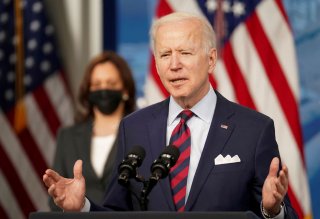How An Overheated U.S. Economy Could Create Chaos
The United States is presently engaged in its largest peacetime budget stimulus on record. That stimulus risks causing economic overheating at home by the end of this year.
This year’s recently released U.S. Treasury Foreign Exchange Report reads like Hamlet would read if we excluded the Prince of Denmark. In seeking the sources for world external imbalances and for global currency misalignments, the Treasury looks everywhere other than where the main source of these imbalances now resides. Here at home in the United States, the world’s largest economy.
As in previous Foreign Exchange Reports, the Treasury identifies three criteria for determining whether or not a country should be labeled as a currency manipulator. Has the country engaged in persistent one-sided currency intervention with the aim of weakening its currency? Is the country running an external current account surplus in excess of 2 percent of Gross Domestic Product (GDP)? Does the country have a bilateral trade surplus with the United States in excess of $20 billion?
The latest Treasury report identifies Switzerland, Taiwan, and Vietnam as meeting all three of the Treasury’s quantitative criteria for being labeled as a currency manipulator. It notes that the United States was presently in consultations with all three countries to address currency undervaluation and payments imbalance issues. However, the Treasury has opted not to go so far as officially labeling any country a currency manipulator, given the exceptional international economic circumstances created by the coronavirus pandemic.
The report also noted that India and Singapore had consistently engaged in one-sided currency intervention. Those countries engage in intervention even though they do not have large external current account surpluses or large bilateral trade surpluses with the United States.
The notable omission in the report is that it makes no mention of the United States as today’s largest contributor to global economic imbalances and to world currency misalignments. This is all the more surprising considering that the United States is presently engaged in its largest peacetime budget stimulus on record. That stimulus risks causing economic overheating at home by the end of this year as well as the return of the twin budget deficit and trade deficit problem of the Reagan years.
The truth of the matter is that by running a budget deficit of around 13 percent of GDP in 2021, the United States is bound to cause its savings level to decline. In addition, by causing the U.S. economy to grow at a very much faster rate than its G-7 economic partners, the United States is bound to cause its imports to grow at a very much faster rate than its exports. Those two factors must be expected to cause the U.S. external current account deficit to widen from its currently already high level. They must also be expected to cause many more countries to meet at least two of the Treasury’s criteria for being labeled as a currency manipulator.
At the same time, the large U.S. budget deficit will also likely cause the U.S. dollar to strengthen in the remainder of the year. It will do so by attracting capital from abroad through the higher interest rates to which the Federal Reserve will be forced to resort to minimize the risk that an overheated U.S. economy will cause inflation to rise above the Fed’s target.
Perhaps it is too much to expect that the Treasury would assume a large part of the responsibility for its trade partners’ large external surpluses that the excessive budget stimulus at home is bound to cause.
However, one would think that the same cannot be said of the International Monetary Fund. Indeed, now would be precisely the time for the IMF to call out the excessive U.S. budget deficit as the principal threat to exacerbating today’s global payment imbalances and currency misalignments. After all, it is the IMF’s primary mandate to seek multilateral cooperation to prevent global imbalances that might be harmful to world economic prosperity. Failing to call out the U.S. excessive budget stimulus would be a flagrant dereliction of the IMF’s duty to the international community.
Desmond Lachman is a resident fellow at the American Enterprise Institute. He was formerly a deputy director in the International Monetary Fund’s Policy Development and Review Department and the chief emerging market economic strategist at Salomon Smith Barney.
Image: Reuters

